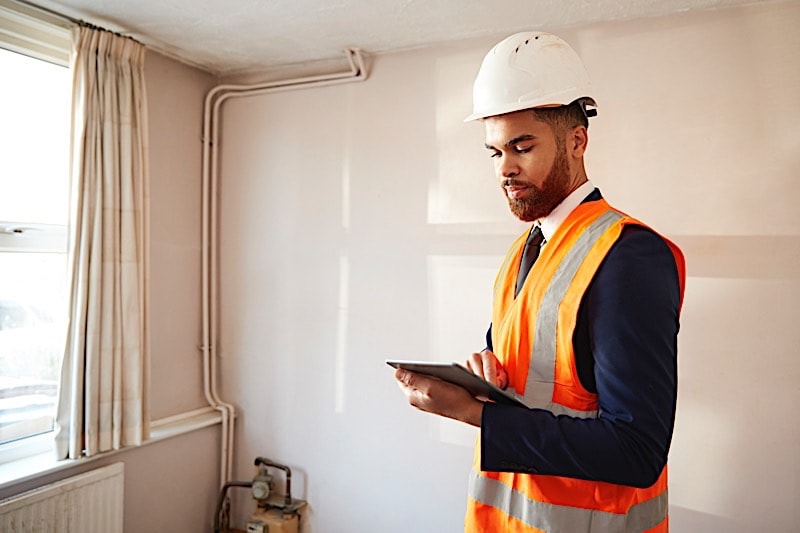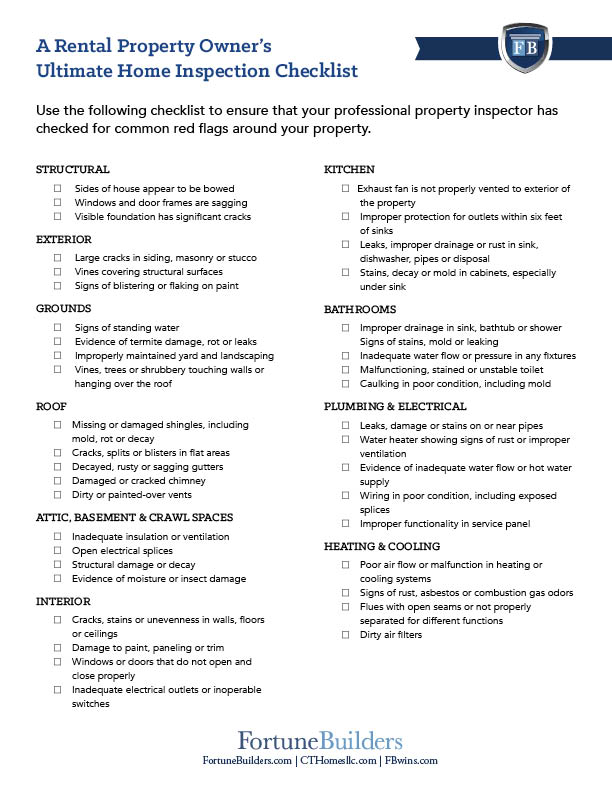You’ve made an offer on a home, your offer was accepted, and now you’re in escrow waiting for inspection day. How will you succeed? By crossing items off our thorough home inspection checklist. With a home inspection checklist by your side, you’ll move into the home of your dreams in no time.
Buying your first home is accompanied by a myriad of emotions. You’re excited because you finally have a place to call your own. You’re nervous to look at your savings account after paying a down payment. You’re exhausted after spending months working with an agent to find the perfect home.
Don’t worry, this rollercoaster of feelings is completely natural and will come to an end soon. The hardest steps are out of the way when all that’s left is an inspection and final walkthrough. And because the inspection process can be demanding, we’ve created an ultimate home inspection checklist to ease your fears and help transition you into the home of your dreams. Who needs first-time homebuyer 101 when you have this available?
[Contact us to make your beautiful Real Estate website. Our Expertise will help you to Start your Real Estate Business and grow your Brand Identity]

What Is A Home Inspection?
A home inspection is an examination of a newly purchased property for any potential issues. The process is typically conducted by a professional inspector, who will then provide a full status report on the home. The purpose of a home inspection is to reveal any problem areas before the end of the closing process. This provides both buyer and seller a chance to renegotiate or even walk away from the transaction if necessary.
While it may sound scary, a home inspection is actually one of the best safeguards put in place for homebuyers. In many cases, home inspections do not reveal any surprises at all. But, when they do, buyers can communicate with the sellers about a potential fix. Any fixes that are made can be checked over in the final walkthrough. It is absolutely crucial to get a home inspection, even if you have a great feeling about the property. The home inspection process can protect you and your wallet from several surprises in the future.
What Are Home Inspection Contingencies?
A home inspection contingency is a clause that you can add to a real estate contract. The clause states that the purchase deal is contingent upon the result of the home inspection. If the inspection results are problematic or unsatisfactory in any way, the contingency gives the buyer the right to back out or negotiate repairs.
Should you decide to include a home inspection contingency in your contract, you’ll have a specific timeframe in which the home inspection has to take place, plus any follow-up evaluations. The typical time period is about one to two weeks. For example, the inspector might call for a specialist to further look into the property’s electrical system. Both the initial inspection and the specialist follow-up have to take place within this timeframe.
If the inspection or any follow-up evaluations reveal any problems that are deal-breakers, you retain the right to pull out of the deal without any consequences. Home inspection contingencies are great for protecting yourself against any unfavorable surprises.
Where To Find A Home Inspector?
In most cases, finding a home inspector is as simple as talking to your real estate agent. They will typically have someone they work with ready to take on the job. In the off chance that they do not, you can find a home inspector by asking other home owners in the area that you trust. Always make sure the inspector’s office is licensed by the state, bonded, and insured. This will help ensure you can trust the person you are working with to resolve any issues, should they ever arise.
Many homeowners also like to see reviews online or previous inspection reports to ensure they are getting a thorough inspector. Don’t be afraid to ask these questions before deciding to work with someone. As mentioned above, this step is crucial to the home buying process. You don’t want to let nerves get the best of you when it comes to protecting your finances.
Ultimate Home Inspection Checklist
If you are working with a professional inspector, he or she should know what to look for. However, it’s also important for investors to be able to identify crucial inspection components. The more one knows about the process, the easier they will be able to evaluate a property of their own. Having said that, there are six categories essential to a house inspection checklist:
- Foundation: Evaluate the property’s foundation and whether or not it will pose any problems down the road
- Structure: Take a close look at the structural integrity of the home, as it will determine several other factors moving forward
- Exterior: Examine the exterior. Don’t leave any stone unturned, whether it’s on the roof or in the yard
- Interior: Walk through the house and be critical of everything you see
- Plumbing/HVAC: Don’t forget to take a look at the property’s plumbing and HVAC unit, as both are big-ticket items worthy of a closer inspection
- Electrical: While harder to examine than just about everything else, it pays to have an idea of how the home’s electrical system is operating
Below you will find a printable home inspection checklist that you can use as your personal guide, as well as to help you get a sense of what to expect during the appointment. Simply click on ultimate home inspection checklist below to get your downloadable guide:

Foundation, Structure, and Exterior
The basis of any house inspection checklist comes down to getting the foundation and structure properly assessed. Review these questions before meeting your inspector to make sure your property is up to par:
- Is the visible foundation in good condition?
- Are there cracks or shifts in the foundation at the base of the walls and ceiling?
- Is there proper drainage carrying water away from the house?
- Are there any obvious soggy areas in the landscaping?
- Is there any evidence of standing water?
- Are there leaks in the septic tank?
- Is there any evidence of termite damage or rotted wood?
- Are windows and door frames square or bowed?
- Are there large cracks in the stucco?
- Is the exterior paint-stained, peeling, or faded?
- Does the home look as though it will need repairs in the near future?
- Is the roof decaying?
- Does the roof have patching?
- Is the chimney in good condition?
- Do the gutters properly drain?
- Is the siding cracked, loose, rotted, or decayed?
Interior
While the interior areas of the home may seem the most straightforward, it is still important to know exactly what to look for during a home inspection. Ask these questions on your house inspection checklist to help you prepare:
- Are there any strange odors coming from inside the home?
- Are any appliances included in the purchase of the home? (I.e. refrigerator, dishwasher, washing machine, etc.)
- Is there evidence of proper insulation?
- Have the electrical outlets been tested?
- Are there stains or other damages on the floors?
- Will any flooring need to be replaced?
- Is there an adequate number of electrical outlets in every room?
- Do windows and doors operate properly?
- Are the joints around window frames caulked?
- Is there leakage in or around sinks?
- Is the water pressure adequate?
- Is there sufficient ventilation throughout the home?
- Do toilets operate properly?
- Can you easily spot the required smoke and carbon monoxide detectors?
- Are there stains on the underside of the roofing in the attic?
- Does the attic have sufficient insulation and ventilation?
- Are there any open electrical splices in the attic?
Plumbing & HVAC
Most first time homebuyers (or even long time homeowners) are unsure of how plumbing and HVAC systems work. Add the following points to your house inspection checklist to help guide you through these potentially unfamiliar areas of a home inspection:
- Do the pipes leak?
- Are pipes rusted or damaged?
- Is the water pump in working condition?
- Does the hot water temperature exceed 125 degrees Fahrenheit?
- Do pipes restrict water flow?
- Does every room in the home receive sufficient airflow?
- Does the cooling unit appear rusty?
- Have the air filters in the cooling unit been replaced recently?
- Is there a history of asbestos on heating pipes, water pipes, are air ducts?
- Can you smell gas?
Electrical
The electrical systems of a property are another crucial aspect of a home inspection checklist. The list below will help make sure you are covered when meeting with an inspector:
- Are there any exposed splices?
- Are cables secured and protected?
- Can you locate the service panel?
- Are fuses or breakers overheating?
What Can Be Excluded From A House Inspection?
The house inspection process is extremely thorough, though there are a few things that are not included. A few examples include internet service, sprinkler systems, and landscaping. The reason for these exclusions is that inspectors are most focused on reviewing the house itself — rather than elements that can be seen as extras to a property. Luckily, these items are typically things you can check during a walkthrough.
A few other areas can be omitted from a home inspection, depending on the property or inspector. These could range from flooring hidden by carpet, roofing covered by snow, the fireplace or chimney, and even pests. The best way to ensure these areas are up to your standards before buying a house could be to ask the inspector, move carpet or snow, or even hire a separate expert on pest control to assess the home. While these added responsibilities may seem overwhelming during the home buying process, they are yet another way to protect yourself when buying a home.

[Contact us to make your beautiful Real Estate website. Our Expertise will help you to Start your Real Estate Business and grow your Brand Identity]
8 Home Inspection Tips For First-Time Buyers
A first time home buyer inspection might seem daunting at first, but it really doesn’t need to be complicated if you know exactly how to prepare. Here are some tips to follow as you prepare for your first inspection, which will correlate with your home inspection checklist:
- Work with referrals to find the right home inspector
- Request a disclosure statement from the seller
- Mind your due diligence and do your own research
- Come up with the right questions to ask
- Identify your deal breakers in advance
- Be there for your home inspection appointment
- Read the home inspection report carefully
- Negotiate repairs after home inspection
1. Find The Right Inspector
If you are working with a real estate agent, they should be able to help you find a licensed home inspector. If not, there are plenty of online resources that will reveal a list of professionals to work with within your area. Rick Hoskins, founder of Filter King, advises: “Do not purchase a home without first hiring an inspector.” He goes on to say that “the inspector’s report will contain detailed information about the type of foundation, and if there are any crawlspaces in the structure of the building. They’ll recommend fixing issues like wood in contact with soil, water penetration, indications of foundation movement, or other structural concerns”.
The best way to find a home inspector that will meet your needs is to ask around. Talk with friends and family to find recommendations. Check online reviews to see whether or not past clients had a positive experience. The last thing you want is to work with an inspector who is more concerned about their paycheck than your well-being. Just be sure to work with a person who has proven, thorough results.
Ask your inspector these questions to discover whether they will be the right fit:
- “Are you a member of a professional inspection organization?” The most reputable inspectors should be a member of either “The National Association Of Home Inspectors,” “The American Society Of Home Inspectors,” or “The International Association Of Certified Home Inspectors.”
- “What is your background and experience?” You want to work with an inspector who has the basics of local building codes and requirements down to a tee. If you are buying an older home or a “fixer-upper,” it is best to find an inspector who has experience working with similar properties.
- “How long will the inspection take?” If your inspector says your inspections will last less than one hour, you are working with the wrong professional. Home inspections take two to three hours on average and can take even longer if you’re moving into a larger home.
- “Can I attend the inspection?” You should attend your final home inspection no matter what. Two sets of eyes are always better than one, and you can’t guarantee your inspector will catch everything. If your inspector refuses to let you attend the inspection, this is an automatic red flag.
2. Get A Seller’s Disclosure Statement
A disclosure statement refers to an informative document given by the seller with any property details they need to make the buyer aware of. In some states, laws and regulations are dictating the type of information required in a disclosure statement. Generally speaking, they include a series of yes or no questions from the seller. Homebuyers should aim to get a disclosure statement before an official home inspection is conducted. The reason for this is because a disclosure statement can draw attention to any areas that have been renovated or repaired; the inspector can then double-check these areas to make sure they were completed properly.
3. Mind Your Due Diligence
This should go without saying, but It is also important to do your own research on potential inspectors ahead of time. (Even if you think you don’t have time, such as when buying a home in summer.) While a plumber or an electrician has in-depth knowledge about certain aspects of a home, your inspector should possess a broad knowledge of a home’s systems and structures. Your inspector should be objective, independent, and not affiliated with the seller in any way. No first-time homebuyer wants an inspector who doesn’t have their best interest in mind.
If possible, walk through your new home on your own before inspection day. This way, you can put together a list of questions for your inspector and the seller. The worst thing you can do is show up to inspection day ill-prepared; you will be blindsided and thus be incapable of assessing every damage.
4. Ask Questions
Once you’ve found the right contractor, make sure to come up with a list of questions to ask. As a rule of thumb, always ask how much the inspection will cost and a rundown for what it covers. There may be some specialized types of inspections that will come as an additional cost. Also, make sure that your contractor can be available on a date and time to work with the deadlines on your purchase agreement. Keep in mind that the actual inspection is just part of the process, and it can take several days to receive the report with the results. Also, verify that the inspector is properly certified.
5. Identify Your “Deal Breakers”
As a homebuyer, you should always keep a budget in mind for home repairs. Throughout the inspection process, you’ll start getting a better idea of how much repairs will cost. In advance, set limitations on how much you are willing to spend on repairs, no matter how much you love the house. Major repairs, such as electrical, plumbing, or structural work, can break your bank if you don’t have a large enough budget. If the inspector returns with unsavory results, be prepared to make a difficult decision of whether or not you want to jump into your purchase.
6. Be There!
You might think that it would be best to stay out of your inspector’s way and let them do their job, but it’s quite to the contrary. Plan on being at the property for the inspection appointment, and don’t be afraid to ask plenty of questions. However, it may be best to reserve your questions for the very end or during breaks to not distract them from their work.
6. Reading Your Home Inspection Report Carefully
After you receive a home inspection report, take time to read through it carefully. Chances are if you are there during the inspection walk-through, you will have an idea of what to expect based on your conversations with the home inspector. Typically the most important items will be noted at the beginning of the report, followed by more detailed sections going throughout the house. Besides every call out there should be images of the problem (if there are any) to help explain the situation.
When reading the report, common issues to look out for include cracks in the foundation, poor drainage, or poor ventilation. Reports may make note of mold, pests or other large issues if they were noted during the inspection. If you have concerns about anything you read in the report, you can ask the inspector for clarification or your real estate agent for advice. The information you review will help you decide whether or not to add contingencies to the purchase of the home.
7. Negotiate Repairs After A Home Inspection
Do not be alarmed if your home inspection report noted any repairs or damage to the property. This is the exact reason to get an inspection done. With that information in mind, discuss possible negotiations with your real estate agent. They may be able to secure a lower purchase price or contingencies, where the seller has to make certain repairs before closing on the property.
While the seller may not agree to make each repair noted in the inspection report, you can negotiate for major repairs. For example, problems with the flooring, HVAC, roof or other areas are often costly. If repairs are needed for these areas, you will likely be able to come to some form of agreement with the seller on how to proceed. Minor repairs, or anything considered normal “wear and tear,” will likely be your responsibility as the buyer.
Summary
As you sign the purchase agreement to the home you’ve found after months of searching, a home inspection checklist might be the last thing on your mind. However, the home inspection is an important process of ensuring that your new property doesn’t have any unexpected repairs that could break your bank. Equip yourself with a thorough checklist, and getting through your first-time home buyer inspection will feel like a breeze.
Ready to start taking advantage of the current opportunities in the real estate market?
[Contact us to make your beautiful Real Estate website. Our Expertise will help you to Start your Real Estate Business and grow your Brand Identity]





